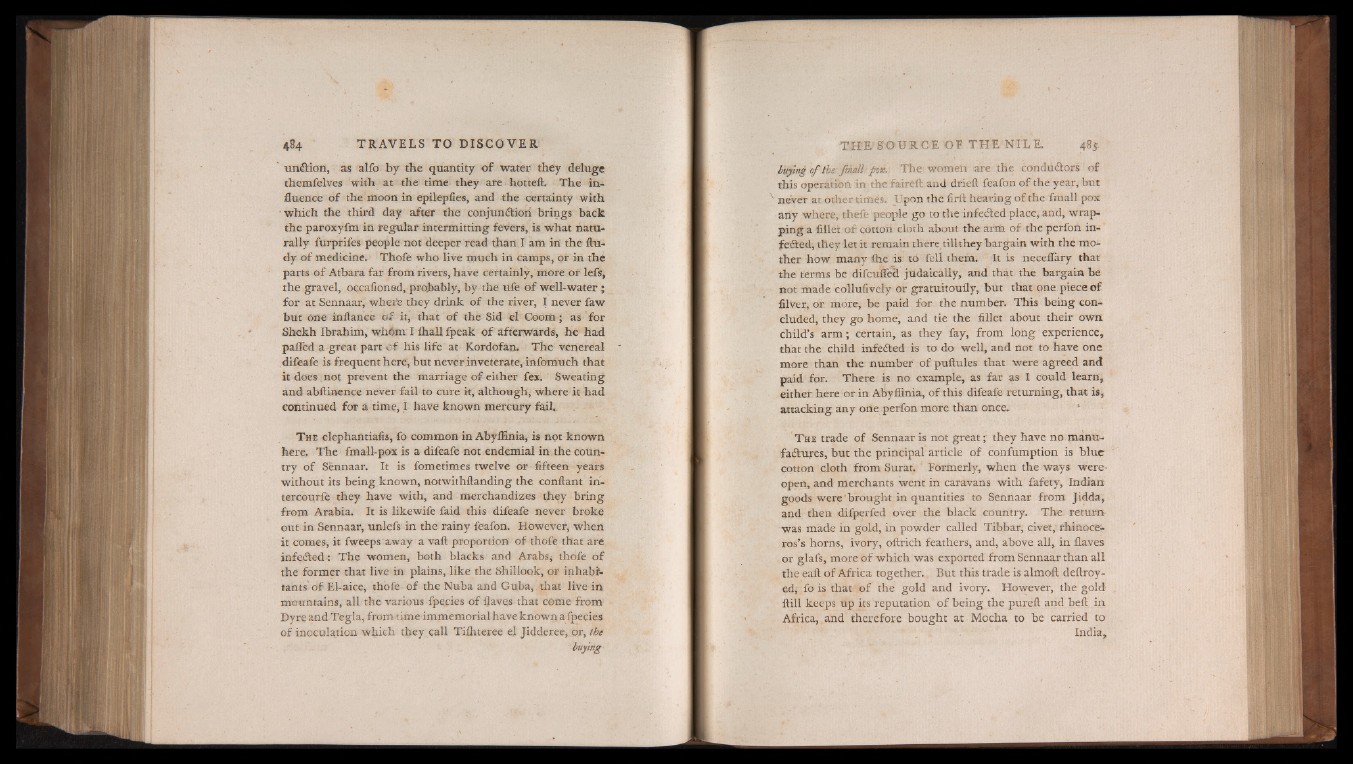
un&ion, as alfo by the quantity o f water they deluge
themfelves with at the time they are hotteft. The influence
o f the moon in epilepfies, and the certainty with
■ which the third day after the conjundtiori brings back
the paroxyfm in regular intermitting fevers, is what natura
lly furprifes people not deeper read than I am in the ftu-
dy o f medicine. Thofe who live much in camps, or in the
parts o f Atbara far from rivers, have certainly, more or lefs,
the gravel, occafionad, probably, by the ufe o f well-wate r;
fo r at Sennaar, where they drink o f the river, I never faw
but one infiance o f it, that o f the Sid el Coom ; as for
Shekh Ibrahim, wh6m I fliall fpeak o f afterwards, he had
palled a great part o f his life at Kordofan. The venereal
difeafe is frequent here, but n ever inveterate, infomuch that
it does not prevent the marriage o f either fex. Sweating
and abftinence never fail to cure it, although, where it had
continued for a time, 1 have known mercury fail.
T he elephantiafis, fo common in Abyffinia, is not known
here. The fmall-pox is a difeafe not endemial in the country
o f Sennaar. It is fometimes twelve or fifteen years
without its being known, notwithftanding the conftant in-
tercourfe they have with, and merchandizes they bring
from Arabia. It is likewife faid this difeafe never broke
out in Sennaar, unlefs in the rainy feafon. However, when
it comes, it fweeps away a vaft proportion o f thofe that are
infedted: The women, both blacks and Arabs, thofe of
the former that live in plains, like the Shillook, or inhabitants
o f El-aice, thofe o f the Nuba and Guba, that live in
mountains, all the various fpeeies o f llaves that come from
Dyre and T egla, from time immemorial have known a fpeeies
o f inoculation which they call Tifhteree ej Jidderee, or, the
buying
buying o f the fmali pox. T h e women are the conductors o f
this operation in the faireft and drieft feafon o f the year, but
x never at other times. Upon the firft hearing o f the fmall pox
any where, thefe people go to the infedted place, and, wrapping
a fillet o f cotton cloth about the arm o f the perfon infedted,
they let it remain there till they bargain with the mother
how many fee is to fell them. It is necefiary that
the terms be difcufled judaically, and that the bargain be
not made collufively or gratuitoufly, but that one piece o f
filver, or more, be paid for the number. This being concluded,
they go home, and tie the fillet about their own
child’s a rm ; certain, as they fay, from long experience,
that the child infedted is to do well, and not to have one
more than the number o f puftules that were agreed and
paid for. There is no example, as far as I could learn,
either here or in Abyffinia, o f this difeafe returning, that is,
attacking any one perfon more than once.
T he trade o f Sennaar is not g r e a t ; they have no manu-
fadhijtes, but the principal article o f confumption is blue
cotton cloth from Surat. Formerly, when the ways were-
open, and merchants went in caravans with fafety, Indian
goods were'brought in quantities to Sennaar from Jidda,
and then difperfed over the black country. The. return
was made in gold, in powder called Tibbar, civet, rhinoceros’s
horns, ivory, oftrich feathers, and, above a ll, in Haves
or glafs, more o f w h ich was exported from Sennaar than all
the eaft o f Africa together. But this trade is almoft deftroy-
ed, fo is that o f the gold and ivory. However, the gold
ftill keeps up its reputation o f being the pureil and belt in
Africa, and therefore bought at Mocha to be carried to
India,